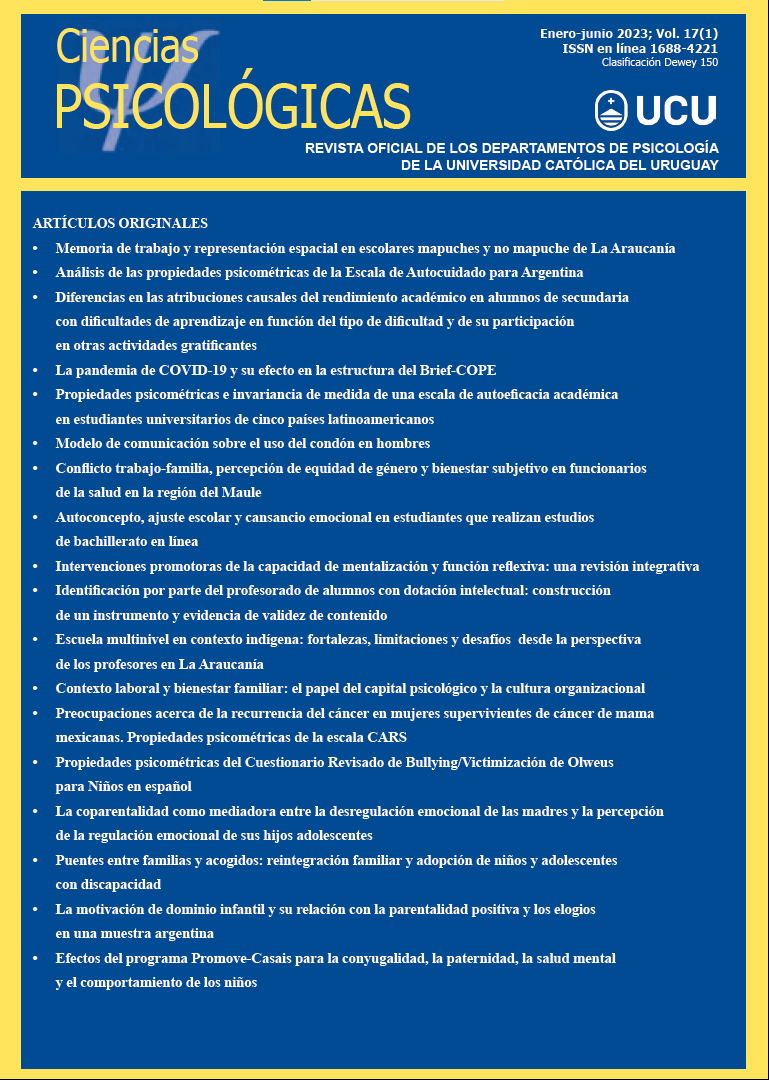Differences in causal attributions of academic performance in secondary school students with learning difficulties based on the type of difficulty and their engagement in other rewarding activities
DOI:
https://doi.org/10.22235/cp.v17i1.3004Keywords:
motivation, learning difficulties, causal attributionsAbstract
This study analyses causal attributions in secondary school students and whether these attributions vary according to the type of difficulty, as well as to success in other areas of personal performance. Patterns of causal attributions and their relation to academic performance and to participation in sports and artistic activities, were assessed on a sample of 371 students aged 13 to 16, of whom 67 were diagnosed with learning difficulties. Results show that the greater the difficulty, the greater the attribution in considering effort as the main cause for achieving success in their learning process; no differences were found by the type of difficulty. Likewise, findings indicate that when students with learning difficulties feel competent in non-academic areas, they can develop better predisposition to achievement. This could have an impact on their ability to cope with learning, their perception of competence and self-regulation processes.
Downloads
References
Atkinson, J. W. (1964). An introduction to motivation. Van Nostrand.
Barca, A. & Peralbo, M. (2002). Los contextos de aprendizaje y desarrollo en la Educación Secundaria obligatoria (ESO). Perspectivas de intervención psicoeducativa sobre el fracaso escolar en la Comunidad Autónoma de Galicia. (3 vols.; Informe final del Proyecto FEDER(1FD97-0283) [Inédito]. Ministerio de Ciencia y Tecnología. https://www.researchgate.net/publication/28079263_Atribuciones_causales_y_enfoques_de_aprendizaje_la_escala_SIACEPA
Barca, A. (2005). Atención a la diversidad en la Educación Secundaria de Galicia. Perfiles del alumnado con bajo rendimiento escolar y propuestas de intervención socioeducativa. Eduga: Revista Galega do Ensino, 45, 353-385.
Barca, A., Peralbo, M., & Breñilla J. C. (2004). Atribuciones causales y enfoques de aprendizaje: la escala SIACEPA. Psicothema, 16(1), 94-103.
Barca, A., Pesutti, C., Brenlla Blanco, J., & Santamaría Canosa, S. (2000). Propiedades psicométricas de la escala SIACEPA (Sistema Integrado de Evaluación de Atribuciones Causales y Procesos de Aprendizaje) en una muestra de alumnos de educación secundaria de Brasil. V Congreso Galego-Portugués de Psicopedagoxía, 4(6), 793-815. https://ruc.udc.es/dspace/bitstream/handle/2183/6742/RGP_6-99.pdf?sequence=1
Douglas, C. E. & Michael, F. A. (1991). On distribution-free multiple comparisons in the one-way analysis of variance. Communications in Statistics - Theory and Methods, 20(1), 127-139. https://doi.org/10.1080/03610929108830487
Eccles, J. S. & Wigfield, A. (2002). Motivational beliefs, values, and goals. Annual Review of Psychology, 53(1), 109-132. https://doi.org/10.1146/annurev.psych.53.100901.135153
Faul, F., Erdfelder, E., Buchner, A., & Lang, A.-G. (2009). Análisis de poder estadístico usando G*Power 3.1: Pruebas para análisis de correlación y regresión. Métodos de investigación del comportamiento, 41, 1149-1160.
Faul, F., Erdfelder, E., Lang, A.-G., & Buchner, A. (2007). G*Power 3: un programa de análisis de poder estadístico flexible para las ciencias sociales, del comportamiento y biomédicas. Métodos de investigación del comportamiento, 39, 175-191.
Fernández, A., Arnaiz, P., Mejía, R., & Barca, A. (2015). Atribuciones causales del alumnado universitario de República Dominicana con alto y bajo rendimiento académico. Revista de Estudios e Investigación en Psicología y Educación, 2(1), 19-29. https://doi.org/10.17979/reipe.2015.2.1.1319
Gil, J. & Hernández, M. (2017). Indefensión aprendida y fracaso escolar. II Congreso Internacional Virtual sobre la Educación en el Siglo XXI. https://www.eumed.net/libros-gratis/actas/2017/educacion/23-indefension-aprendida-y-fracaso-escolar.pdf
González, M. del C. & Tourón, J. (1992). Autoconcepto y rendimiento escolar: sus implicaciones en la motivación y en la autorregulación del aprendizaje. Universidad de Navarra. https://acortar.link/ymA2Hv
González-Pienda, J. A., Núñez, J. C. & González-Pumariega, S., Álvarez, L., Roces, C., García, M., González, P., Cabanach, R. G. & Valle, A. (2000). Autoconcepto, proceso de atribución causal y metas académicas en niños con y sin dificultades de aprendizaje. Psicothema, 12(4), 548-556.
Haynes, T., Daniels, L., Stupnisky , R., Perry, P., & Hladkyj, S. (2008). The effect of attributional retraining on mastery and performance motivation among first-year college students. Basic and Applied Social Psychology, 30(3), 198-207. https://doi.org/10.1080/01973530802374972
Jamovi Project. (2022). Jamovi (Versión 2.3.18) [Software].
Louick, R. & Scanlon, D. (2019). Sustained feelings of success and agency: keys to literacy motivation among adolescents with learning disabilities. Exceptionality, 29(1), 1-15. https://doi.org/10.1080/09362835.2019.1639184
Manassero, M. & Vazquez, A. (1995). La atribución causal como determinante de las expectativas. Psicothema, 7, 361-376.
Navarrete, I. & Cuadro, A. (2007). Estilos atribucionales causales y rendimiento académico en estudiantes de ciclo básico de Montevideo. XIV Jornadas de Investigación y Tercer Encuentro de Investigadores en Psicología del Mercosur. https://www.aacademica.org/000-073/317
Ramudo Andión, I., Barca Lozano, A., Brenlla, J. C., & Barca Enríquez, E. (2017). Metas académicas, atribuciones causales y género: su determinación en el rendimiento académico del alumnado de bachillerato. Revista de Estudios e Investigación en Psicología y Educación, (1), 143-147. https://doi.org/10.17979/reipe.2017.0.01.2436
Sáez F. M., Bustos, C. E., Pérez, M. V., Mella, J. A., Lobos, K. A., & Díaz, A. E. (2018). Disposición al estudio, autoeficacia y atribuciones causales en estudiantes universitarios chilenos. Propósitos y Representaciones, 6(1), 199-245. http://dx.doi.org/10.20511/pyr2018.v6n1.179
Sideridis, G. D. (2009). Motivation and learning disabilities: past, present, and future. En K. R. Wentzel & A. Wigfield (Eds.), Handbook of motivation at school (pp. 605-625). Routledge.
Soria, M., Otamendi, A., Berrocal, C., Caño, A., & Rodríguez Naranjo, C. (2004). Las atribuciones de incontrolabilidad en el origen de las expectativas de desesperanza en adolescentes. Psicothema, 16(3), 476-480.
Tsujimoto, K. C., Boada, R., Gottwald, S., Hill, D., Jacobson, L. A., Lovett, M., Mahone, E. M., Willcutt, E., Wolf, M., Bosson-Heenan, J., Gruen. J. R., & Frijters J. C. (2018). Causal attribution profiles as a function of reading skills, hyperactivity, and inattention. Scientific Studies of Reading, 23(3), 254-272. https://doi.org/10.1080/10888438.2018.1529767
Valenzuela, J. (2007) Exigencia académica y atribución causal: ¿qué pasa con la atribución al esfuerzo cuando hay una baja significativa en la exigencia académica? Educere, 11(37) 283-287.
Weiner, B. (1979). A theory of motivation for some classroom experiences. Journal of Educational Psychology, 71, 3-25. https://psycnet.apa.org/doi/10.1037/0022-0663.71.1.3
Weiner, B. (1986). An attributional theory of emotion and motivation. Springer-Verlag. https://doi.org/10.1007/978-1-4612-4948-1
Weiner, B. (1992). Human motivation. Metaphors, theories and research. Sage.
Downloads
Published
How to Cite
Issue
Section
License
Copyright (c) 2023 Universidad Católica del Uruguay

This work is licensed under a Creative Commons Attribution 4.0 International License.
















